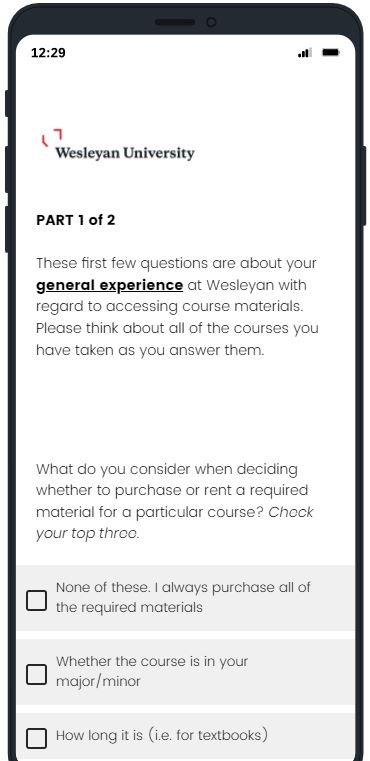The Nano Survey

This survey allows faculty to get a quick sense of the student experience regarding textbooks in specific courses they are teaching. In Fall 2021, we administered it in two STEM courses and one language course. Here is what we learned:
- 66% to 72% of students said that when considering whether they will purchased a required course material, they consider whether there is a free alternative online. This was the most common consideration among our survey respondents.
- Other common considerations were: what the professor (42 to 61%) or other students (19% to 42%) have said about how often the material will be used during the semester, and how much the material costs (25% to 62%).
- Among those students who reported they had not purchased course materials for a specific class, few (4% to 21%) were using Wesleyan supported resources (library course reserves, Resource Center Library) as their main alternative
Interested in having us administer this survey in your class. Give the demo version a try and then let us know!
Focus Groups
In Fall 2021, we conducted two focus groups with students about how they choose what course materials to purchase. Here are a few things our student participants said.
It’s like, “oh, do this reading,” and then when we get to class, we don’t actually talk about the reading itself. So it feels very pointless to just spend that much money on a textbook that we don’t go into.
The fact that it wasn’t really something that was necessary to succeed in the course really impacted my decision not to get books for that one class.
Discussion-based classes, your books are probably required. Lecture-based, not necessarily.
There’s no real need to pay for a textbook or rent it, especially if you’re going to be focusing more on the professor’s lectures than you are on the textbook information.
The professor will be like, “You have to get this [set of books],” and usually it’s more like two that are really required and the other two are like [shrugs]… so it’s specified in the syllabus, and then some other professors, they’re just like, “This is a list of the readings that we’re going to do.” And then that’s when you have to rely on the verbal cues more than anything else.
…there were a lot of required readings and the professor hinted at the fact that they weren’t really required readings. So I just didn’t actually buy any of them, which sounds really bad. But I mean, honestly, it was the professor’s own words that “technically they’re required, but you don’t really have to do them.”
I’ve been a pdf dealer in some of my classes, right? Like, this is a $200 textbook new, it’s 400 pages, but I found the pdf, and I’m not gonna make anybody buy it or struggle to look for it when I have it.
I remember my first Department X class, because we’re talking about resources, and [the professor is] just like, “Ask your class. Ask people who already took this class. I can’t say anything.”
When I first got to college, I definitely tried to do the “good student,” get all of my textbooks. It’s a physical copy so I can bring them to my classes and cross reference them. And then that ended up being a whole lot of money.